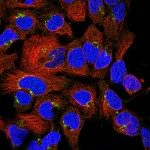Lien vers Pubmed [PMID] – 31374255
Lien DOI – S1286-4579(19)30074-710.1016/j.micinf.2019.06.014
Microbes Infect ; 21(5-6): 254-262
Only a profound understanding of the structure and function of cells – either as single units or in the context of tissues and whole organisms – will allow a comprehension of what happens in pathological conditions and provides the means to fight disease. The Cell Biology and Infection (BCI for Biologie Cellulaire et Infection) department was created in 2002 at the Institut Pasteur in Paris to develop a research program under the umbrella of cell biology, infection biology and microbiology. Its visionary ambition was to shape a common framework for cellular microbiology, and to interface the latter with hard sciences like physics and mathematics and cutting-edge technology. This concept, ahead of time, has given high visibility to the field of cellular microbiology and quantitative cell biology, and it has allowed the successful execution of highly interdisciplinary research programs linking a molecular understanding of cellular events with disease. Now, the BCI department embraces additional pathologies, namely cancer and neurodegenerative diseases. Here, we will portray how the integrative research approach of BCI has led to major scientific breakthroughs during the last ten years, and where we see scientific opportunities for the near future.



